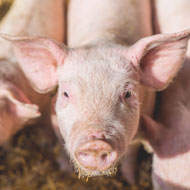Living close to livestock reduces allergy risk

Protection tied to living close to a farm was strongest for those who lived near cattle or pigs.
Living close to livestock appears to reduce the risk of allergies, according to new research.
The study, published in the journal Occupational & Environmental Medicine, found that people who lived within 327 meters (1,073 feet) of a farm were less likely to experience allergies compared to those living more than 500m (1,640 feet) away.
Researchers found similar results when they looked specifically at pig and cattle farms.
Speaking to news agency Reuters, senior author Lidwien Smit of Utrecht University said: "For 20 years, a large number of studies have shown that allergies are less prevalent in farmers and farmers' children.
“Farming is actually one of the few environmental exposures consistently linked to respiratory allergies. It's important because the number of people affected by respiratory allergies has sharply increased over the last few decades."
More than 2,400 participants submitted blood samples to the study, which were analysed for allergy antibodies to cats, dogs, dust mites and grass. The researchers also used weather and geographic data to ascertain the distance of each person’s home from neighbouring farms, the types of animals on those farms, and to estimate dust emissions.
They report that around 30 per cent of participants had allergies, mostly to grass and house dust mites. About a third of the participants had lived on a farm during childhood.
The team notes that protection tied to living close to a farm was strongest for those who lived near cattle or pigs, as well as those who grew up on a farm.



 The veterinary mental health charity Vetlife is inviting the veterinary community to join it for a sponsored cold-water dip.
The veterinary mental health charity Vetlife is inviting the veterinary community to join it for a sponsored cold-water dip.